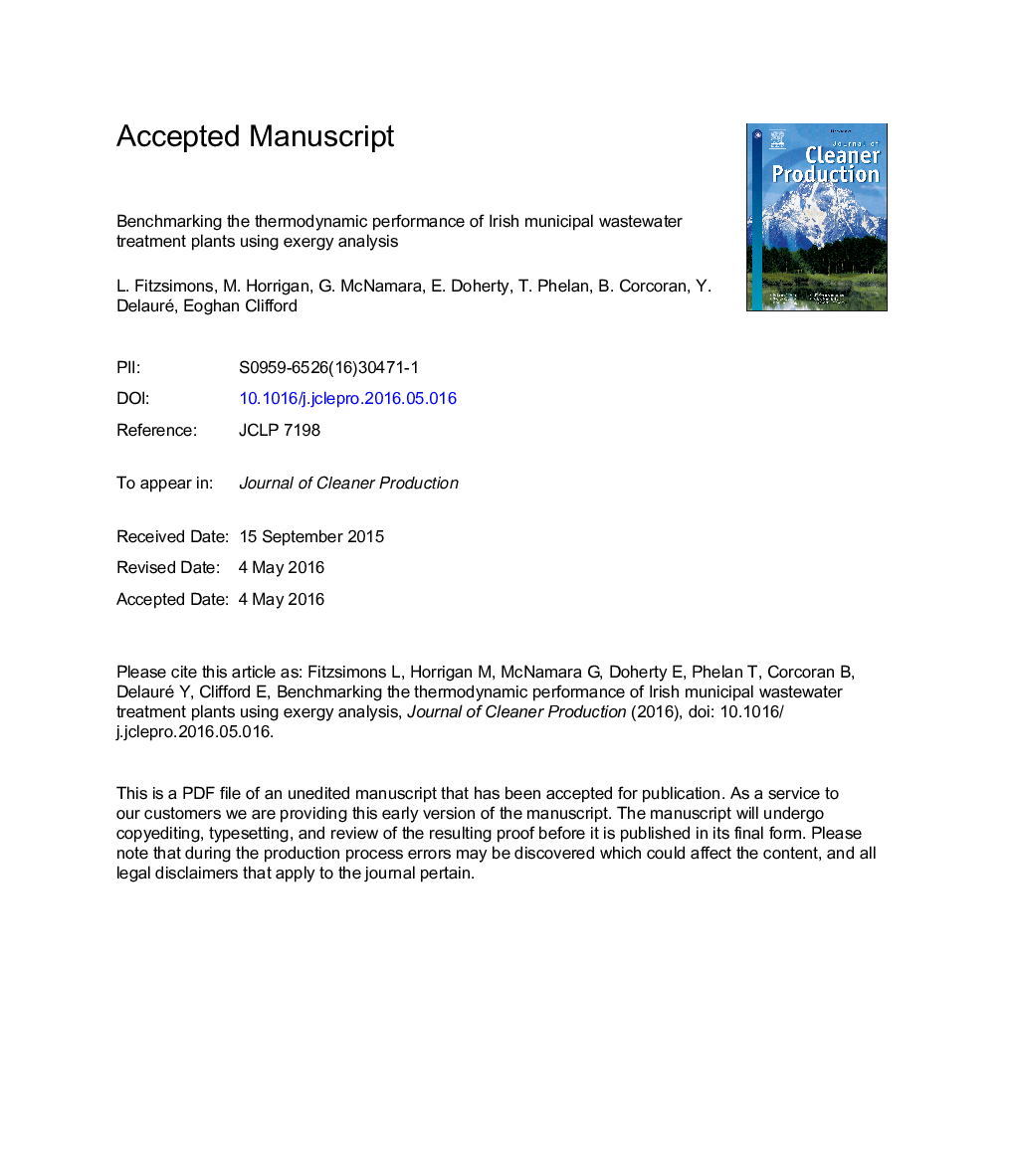| کد مقاله | کد نشریه | سال انتشار | مقاله انگلیسی | نسخه تمام متن |
|---|---|---|---|---|
| 8101636 | 1522118 | 2016 | 24 صفحه PDF | دانلود رایگان |
عنوان انگلیسی مقاله ISI
Assessing the thermodynamic performance of Irish municipal wastewater treatment plants using exergy analysis: a potential benchmarking approach
ترجمه فارسی عنوان
ارزیابی عملکرد ترمودینامیکی تاسیسات تصفیه خانه فاضلاب شهر ایرلند با استفاده از تحلیل اگزرژی: یک روش بالقوه ارزیابی
دانلود مقاله + سفارش ترجمه
دانلود مقاله ISI انگلیسی
رایگان برای ایرانیان
کلمات کلیدی
تجزیه و تحلیل اگزرژی، تصفیه فاضلاب، کارآیی منابع، بهره وری انرژی، معیار سنجش،
ترجمه چکیده
تصفیه فاضلاب یک فرآیند فشرده با استفاده از چندین ورودی مانند انرژی، مواد شیمیایی و آب برای تولید پساب است که مطابق استانداردهای زیست محیطی تعیین شده است. پیش بینی شده است که نیازهای تخلیه فزاینده سختگیرانه شامل درمان بهتر مواد مغذی و نیاز به درمان آلاینده های در حال ظهور است، یعنی آلودگی هایی که معمولا در محدوده محیطی نظارت نمی شوند، اما ممکن است باعث آسیب زیست محیطی شوند. یکی از نتایج پیش بینی شده از استانداردهای فاضلاب افزایش مصرف انرژی است. در کنار این، هزینه های انرژی نوسان و نیاز به کاهش انتشار کربن بر پایه سوخت فسیلی منجر به تمرکز بیشتر بر کارایی انرژی کارآمد گیاهان تصفیه فاضلاب شده است. تجزیه و تحلیل اگزرژی به عنوان یک ابزار مفید برای ارزیابی کارایی منابع حرارتی و دیگر سیستم های انرژی شناخته شده است. رویکرد اگزرژی یک مبنای منطقی برای بهینه سازی فرآیند است، که در آن، تئوری، فرآیندهای با بزرگترین تخریب اگزرژی، بهترین گزینه های بهره وری انرژی را نشان می دهند. در این تحقیق، برای ارزیابی و مقایسه بهره وری انرژی / منابع دو ایستگاه تصفیه خانه فاضلاب ایرلند از تحلیل اگزرژی استفاده شده است. یکی از اهداف مهم بررسی مناسب بودن تحلیل اگزرژی به عنوان یک روش سنجش بالقوه برای تاسیسات تصفیه فاضلاب است. اگر چه دو گیاه تصفیه فاضلاب مقیاس مشابه هستند و از تکنولوژی مشابه استفاده می کنند، نتایج تجزیه و تحلیل اگزرژی به طور قابل توجهی متفاوت است. به عنوان مثال، تخریب اگزرژی درمان ثانویه بین دو گیاه تصفیه فاضلاب تقریبا 67٪ متفاوت است. علاوه بر این، پیش درمان و درمان ثانویه اثرگذاری فوق العاده گیاهان هر دو گیاه به طور قابل توجهی متفاوت بود: یک گیاه تصفیه فاضلاب دارای کارایی عظیم 5/27 درصد در مقایسه با 2/40 درصد برای گیاه دوم بود. یکی از عوامل مهم کاهش ریسک شناسایی شد: تفاوت بین غلظت فاضلاب ورودی آنها. این نتایج نشان می دهد که معیارهایی مانند تخریب اگزرژی هنگام ترکیب با توجه به کیفیت آب می تواند یک ابزار مفید در مقایسه با عملکرد کلی گیاهان تصفیه فاضلاب باشد.
موضوعات مرتبط
مهندسی و علوم پایه
مهندسی انرژی
انرژی های تجدید پذیر، توسعه پایدار و محیط زیست
چکیده انگلیسی
Wastewater treatment is a resource intensive process utilising several inputs such as energy, chemicals and water to produce an effluent that meets designated environmental standards. It is predicted that increasingly stringent discharge requirements will include better treatment of nutrients and the need to treat emerging pollutants, i.e. pollutants not commonly monitored in the environment currently, but which have the potential to cause environmental damage. One expected outcome of increased effluent standards is higher energy consumption. Coupled with this, fluctuating energy costs and the need to mitigate fossil fuel based carbon emissions have led to a greater focus on the energy efficient operation of wastewater treatment plants. Exergy Analysis has been identified as a useful tool to assess the resource efficiency of thermal and other energy systems. The exergy approach provides a rational basis for process optimisation, where, in theory, the processes with the greatest exergy destruction represent the greatest energy efficiency opportunities. In this research, exergy analysis has been used to assess and compare the energy/resource efficiency of two Irish wastewater treatment plants. One important objective is to investigate the appropriateness of exergy analysis as a potential benchmarking approach for wastewater treatment plants. Although the two wastewater treatment plants are of similar scale, and use similar technologies, the results of the exergy analysis were significantly different. For example, the secondary treatment exergy destruction differed by as much as 67% between the two wastewater treatment plants. Furthermore, the coupled pre-treatment and secondary treatment exergetic efficiencies of both plants differed significantly: one wastewater treatment plant had an exergetic efficiency of 27.5% in comparison with 40.2% for the second plant. One important mitigating factor was identified: the difference between their incoming wastewater concentrations. These results indicate that metrics such as exergy destruction when combined with consideration of water quality can be a useful tool in the comparing the overall performance of wastewater treatment plants.
ناشر
Database: Elsevier - ScienceDirect (ساینس دایرکت)
Journal: Journal of Cleaner Production - Volume 131, 10 September 2016, Pages 387-398
Journal: Journal of Cleaner Production - Volume 131, 10 September 2016, Pages 387-398
نویسندگان
L. Fitzsimons, M. Horrigan, G. McNamara, E. Doherty, T. Phelan, B. Corcoran, Y. Delauré, Eoghan Clifford,
